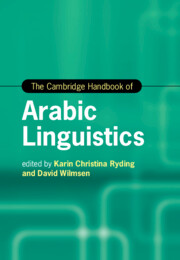Book contents
- The Cambridge Handbook of Arabic Linguistics
- Cambridge Handbooks in Language and Linguistics
- The Cambridge Handbook of Arabic Linguistics
- Copyright page
- Contents
- Figures
- Tables
- Notes on Contributors
- Acknowledgements
- Abbreviations
- Introduction
- Part I Arabic Applied Linguistics
- Part II Arabic Variation and Sociolinguistics
- 7 Diglossia, Variation, and Structural Complexity
- 8 Sociolinguistic Variation and Variation in Sociolinguistics
- 9 What Is Formal Spoken Arabic?
- 10 Arabic Dialectology
- 11 Maltese
- Part III Theoretical and Descriptive Studies
- Part IV Arabic Computational and Corpus Linguistics
- Part V Arabic Linguistics and New Media Studies
- Part VI Arabic Linguistics in Literature and Translation
- Index
- References
7 - Diglossia, Variation, and Structural Complexity
from Part II - Arabic Variation and Sociolinguistics
Published online by Cambridge University Press: 23 September 2021
- The Cambridge Handbook of Arabic Linguistics
- Cambridge Handbooks in Language and Linguistics
- The Cambridge Handbook of Arabic Linguistics
- Copyright page
- Contents
- Figures
- Tables
- Notes on Contributors
- Acknowledgements
- Abbreviations
- Introduction
- Part I Arabic Applied Linguistics
- Part II Arabic Variation and Sociolinguistics
- 7 Diglossia, Variation, and Structural Complexity
- 8 Sociolinguistic Variation and Variation in Sociolinguistics
- 9 What Is Formal Spoken Arabic?
- 10 Arabic Dialectology
- 11 Maltese
- Part III Theoretical and Descriptive Studies
- Part IV Arabic Computational and Corpus Linguistics
- Part V Arabic Linguistics and New Media Studies
- Part VI Arabic Linguistics in Literature and Translation
- Index
- References
Summary
Samira Farwaneh interrogates the largely unquestioned and untested assumption in linguistics that languages are all equally complex. Again, the indelible mark of diglossia in Arabic on theorizing about language colours the analysis, specifically with the notion that the formal Arabic of writing and declamation is necessarily more complex than the natively spoken varieties of the language. Starting from the assumption, shared by native speakers of Arabic and many linguists studying Arabic alike, that spoken varieties are simplifications of a more structurally complex and presumably chronologically older Arabic, represented by the Arabic of classical writing and its modern written descendant, she demonstrates that Arab dialects are in some ways more structurally complex than the Arabic of writing, specifically respecting the tense, mood, and aspect systems of spoken Arabi, the manifestations of indefinite noun constructs and object marking, and specifically in the so-called ‘dialectal tanwin’, co-referential and ethical dative marking, and in negation.
Information
- Type
- Chapter
- Information
- The Cambridge Handbook of Arabic Linguistics , pp. 155 - 180Publisher: Cambridge University PressPrint publication year: 2021
References
Accessibility standard: Unknown
Why this information is here
This section outlines the accessibility features of this content - including support for screen readers, full keyboard navigation and high-contrast display options. This may not be relevant for you.Accessibility Information
- 1
- Cited by
